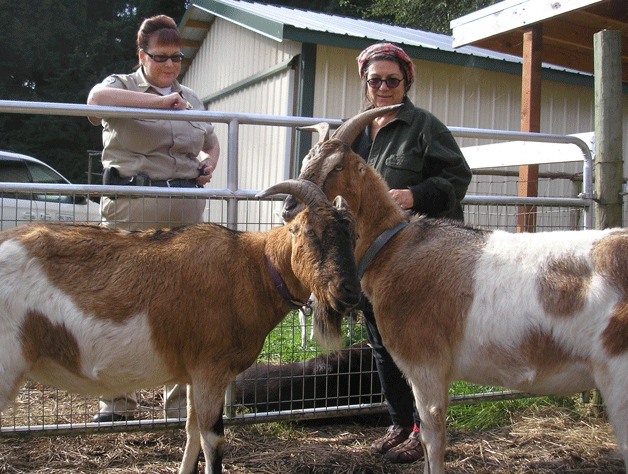If your two goats have gone missing, take a look in Bayview.
A matched set of adult La Mancha males were spotted wandering more than a week ago in the Goss Lake and Lone Lake areas, meandering in and out of people’s yards, munching the shrubbery.
“They’re the friendliest, most personable goats I’ve ever met,” said Jim Hyde of Bayview.
Hyde has met plenty of goats. He and his wife Jane have been in the business of taking in stray and unwanted goats for more than 20 years.
The couple operate Goat Rescue on their 25-acre forest farm, where with the help of a website, the first in the world of its kind, they provide a matching service for people who want to get rid of pet goats, and those who want to adopt them.
Their latest acquisitions, two wethered (castrated) males about 5 or 6 years old and probably brothers, were first seen roaming near Goss Lake on Monday night, drawing a 911 call to the Island County Sheriff’s office.
More calls came in the next day from different sections of the general area, and the case was turned over to Island County Animal Control Officer Carol Barnes, who contacted the Hydes as per an informal agreement with the county.
The Hydes found the four-footed pair wandering near Lone Lake, and brought them to their nearby farm.
The goats are La Manchas, an old breed of milk and meat goat originating in Spain and known for their tiny ears, Jim Hyde said.
They both are mostly tan in the front, and white in the rear, with brown blotches on their hind quarters. One wears a purple collar, the other a blue collar. There is no identification.
Hyde said the goats are well-groomed, and seem to have had excellent care. He said they appear to have been tethered to a tree or a post, and that they probably slipped their nooses and vamoosed.
“Goats are very clever,” Jane Hyde said. “They manage to find ways to get out of places. They’ll jump over a fence, or climb on the back of a horse and jump over.”
“They learn how to open gates,” she said. “There’s a little bit of a trick to keeping them.”
“They’re very nice-looking,” Jim Hyde said. “It’s strange no one has come forward. I think they must be somebody’s beloved pets.
“It’s gotta be someone on the island,” he added. “Nobody brings goats over from the mainland.”
He said the couple will be looking for someone to adopt the pair if they aren’t claimed.
“We’ll wait about a week,” Barnes said.
“We’ll be looking to place them in a loving home,” Jim Hyde said. “Even little children could be around these goats, they’re so tame.”
“But they’ll have to go as a pair,” he added. “They’ve bonded.”
The Hydes have operated Goat Rescue for about
15 years, getting their start in northern California before coming to South Whidbey about six years ago.
They said they immersed themselves in the goat world about 20 years ago, when a neighboring farmer gave them a pair of young kids. One of the goats died, however, and the other was consumed with loneliness.
“He did nothing but cry,” Jane Hyde said. “We had to bring him into the kitchen with us.”
“Goats have a very strong herd instinct,” she added. “We learned quickly that you have to have at least two goats.”
She said it was difficult to find another goat back then, but they eventually located two more. Before long, she said, “people started dropping goats off.”
At the peak of their rescue operation, the Hydes were caring for 27 goats. They currently have 12, counting the newcomers.
They said Goat Rescue is similar to dog and cat rescue services, with one major difference.
“People eat goats,” Jim Hyde said.
For that reason, he and his wife are thorough about their adoptions. They even make home visits, to determine if a prospective new owner is prepared to accommodate a goat as a pet.
Goat Rescue is financed out of the pair’s own pockets, with occasional contributions from people who have adopted the animals, they said.
Jim Hyde said it costs about a dollar a day to care for a goat, including hay and medical attention.
“It take a lot of hay and a lot of work just to keep enough meat on their bones to keep them happy and alive through the winter,” he said, adding that a goat won’t go out in the rain, because rain lowers its body temperature.
“It’s sheer love that keeps us going to keep them going,” his wife said.
Jim Hyde said the expense of maintaining their service has kept it deliberately low-key.
“We hate to say no, but we’re not out promoting and looking for goats.” his wife said.
She said most of the goats that come to them are older adults who for some reason can’t be cared for any longer by their owners, either for financial or personal reasons.
“Lots of little goats out there need home,” she said. “It’s a very common story.”
Meanwhile, the Hydes’ new boarders help pay for their keep by doing some strategic mowing, while the couple wait to see if their owners come to claim them.
“They’ve landed in a good place to be,” Jane Hyde said, “but it would be nice if we can find a good home.”
“People have been keeping goats as pets for centuries, ever since there have been goats and people,” Jim Hyde said.
“They’re not everybody’s cup of tea,” added his wife. “But it’s a wonderful way to get started.”
To find out more about Goat Rescue, visit www.goatrescue.org or call 321-4747.



